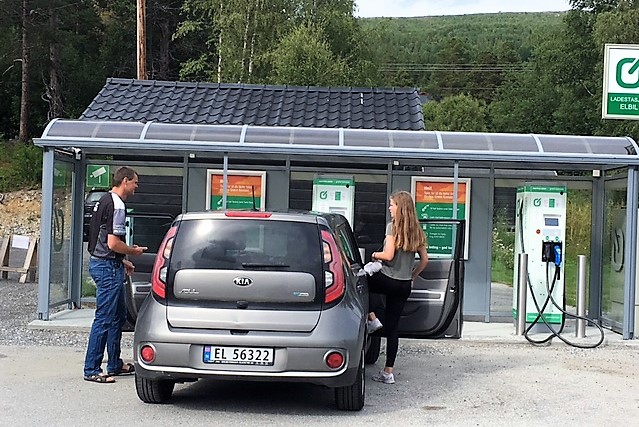
SOMETHING IS ROTTEN
Fifty years ago, when Lesjaverk (the small village where my house is situation) was slightly larger than the 174 people now living permanently in this community along the highway running through the valley of Gudbrandsdalen, I remember that there was a petrol station next to the general store. Leaded petrol for the cars stopping on their long and slow drive on winding roads through the mountains from or to the capital down south. Diesel for the tractors of the local farms. While the goods sold in the general store owned by the Doseth family were necessary for the daily life of the villagers, the petrol station was not only a practical necessity, but as much a sign of Lesjaverk as an important member of the larger community. Back then most of the cars stopping to fuel had Norwegian plates (I know because we used to write the numbers down in a small book), but we also witnessed cars from Germany, Italy, France and Spain – in addition to the cars from neighboring Sweden and Denmark. Lesjaverk was important, no doubt about it.
One summer the petrol station was no longer there. The seemingly never ending process of companies rationalizing operations and cutting down on ‘redundant’ elements to allow profits to be maximized had finally reached Lesjaverk. Villagers are practical people, so they understood the logic behind the decision. However, they were shaken in their self-understanding. They were also deeply worried that the only other visible link to the greater outside world, the railroad station, would be next in line for rationalization – resulting in further marginalization of the community. They were right. Some years later, the station manager left. There would no longer be a person selling tickets in the wooden building next to the rails, nor a person with a green flag greeting incoming and departing trains. Tickets could be purchased on the website of Norwegian Railroads. Trains would still stop, but without flags being waved.
All of the above as a background to understand why my heart started beating violently with joy a few days ago, when I returned to Lesjaverk and saw a new ‘station’ next to the general store. No petrol. No diesel. ONLY ELECTRICITY. Once again Lesjaverk was visibly part of the larger world, and the villagers could once again walk along the road with heads high and a sense of pride. Being part Norwegian and a long-time member of the Lesjaverk community, I happily share the sense of being part of something important and necessary. Being a Danish citizen, I also feel betrayed by inward-looking and ignorant Danish politicians, who continue to believe that petrol and diesel is the future.
I asked the young couple on the photo above where they were coming from, where they were going to, how practical it was to own a car running on electricity only, how costly and time-consuming it was to fill up the tank. For this generation of motorists it all seemed entirely natural and straightforward. The government had introduced a number of measures that made it advantageous to buy a car running on electricity. Of course, they agreed that as individuals and as a nation, we had to contribute to making Norway sustainable for all the reasons we now know so well. They also felt that whether you voted red or blue politically, the transformation had to be helped along by pro-active and agressive legislation. Norway had moved from being a modestly wealhty country to one of the richest in the world measured by per capita income thanks to the enormous amounts of oil hidden in the fields under the seabed along the western coast. The oil would be finished one day in the not so distant future. Some of the oil also had to stay in the fields for environmental reasons, and to help stop the dangerous forces of climate change.
Denmark and Norway are admittedly similar in many ways, which should not come as a surprise, considering our shared history. However, in this particular area of preparing the nation for the future, the two countries have taken very different directions, and I will not hesitate to characterize the situation in Denmark as we know it from Shakespeare’s Hamlet– something is definitely rotten. Let me explain how I see things as they are presently unfolding in my home country in this area. If some readers get the sense that I feel emotional about this area, they are entirely correct!
We need to move back around 25 years or more. I was part of the Danish NGO community working with the preparations for the global UN conference on environment and development in Rio de Janeiro in Brazil in 1992. The major background document for this conference was the report titled Our Common Future, also known as the Brundtland Commission Report, published in 1987. Together with others, I made the publication in Denmark possible, and I also helped translate the report into Danish. I still consider this report to be one of the most important reports published by the UN system in that decade. Most of what we discuss today as necessary changes to the way we presently produce, consume, trade and invest was presented in the Brundtland report.
From January 1993 until November 2001, the Social Democrat Svend Auken was Minister for the Environment and for Energy. I did not know him well personally, but I met him on several occasions when I was part of organizing delegations from developing countries coming to Denmark to learn about how we tried to deal with the challenges facing Denmark as part of the follow-up to the agreements made at the conference in Rio. I vividly remember one occasion, when I was standing with a delegation on the steps leading up to the entrance to the Danish parliament, waiting for the Minister to arrive for our meeting. This was planned, because I knew that Svend Auken would arrive on his old bicycle, and I wanted our friends from the global south to see the difference between how a Danish minister behaved compared to what they were used to at home. This was good old Danish democracy in practice, with little distance between people and politicians. The delegates were confused of course. How could this happen? Because ‘minister’ means ‘servant of the people’, the minister explained, before he led our way into parliament with his youthful smile.
Svend Auken was unquestionably a very bright politician, one of the smartest of his generation. For reasons that are outside the framework of this article, he never reached the pinnacle of politics and became Prime Minister of Denmark, despite being the Chairman of the Social Democrats. Still, he is one of the few Danish politicians that have managed to put Denmark effectively and convincingly on the global map on how nations must and can deal with environmental and climatic issues. He strongly believed in the need for a small country like Denmark to take the lead. Danish CO2 emissions may not amount to a lot in a global perspective, but we can still lead by showing others what is possible. When Denmark today is being hailed as an example, it is first of all because of what Svend Auken and the governments he was a part of decided to do in the 90s.
Right wing (we call the parties ‘blue’) governments have been in power most of the time since 2001 – including the present coalition government of three parties, and they have never seen the environment and the climate change agenda as important. Full stop! They have never seen them as equally important as making sure that the private sector could make money and compete in the global market. They have not seen them as areas for Denmark to show global leadership, certainly not decades back when others argued that this would be an area for future profit making. The rhetoric only turned more positive when it became apparent to even the most ignorant cynics on the right that a strong global consensus to do something was emerging, with CEOs, heads of government, academics, politicians, church leaders, NGOs and yes, ordinary citizens. They all backed the call for action – NOW! When Danish CEOs across the board called for political leadership, the politicians on the right only reluctantly and without heart took action.
Seen from the outside, it has been like an ideological crusade of almost religious proportions, focused on destroying the legacy of Svend Auken. Similar to the religious fervor seemingly driving President Trump in his effort to destroy Obamacare. In both cases, knowledge is seen as an inconvenient obstacle; facts are at best ‘massaged’ to fit the political situation, or at worst manipulated; experts are by definition considered to be ‘progressive’ or ‘leftist’, and consequently they are not objective. A very sad situation.
Before the young couple left the Lesjaverk Loading Station to continue the jouney towards Oslo, I told them that I was actually Danish. They threw up their arms in despair, smiled loudly, and then stated: “The Danes are in trouble, you have to get your act together, sooner rather than later.” They are so right. The future of the planet as well as both present and future generations depend on all political parties coming together to take responsibility and make decisions, based on the available evidence agreed upon by the large majority of scentists. This also includes the transition to cars powered by electricity rather than petrol and diesel. It generally requires leadership based on genuine conviction rather than political expediency. It needs a show of heart that rises above crude calculation.
True, Denmark is still at the top, thanks to the investments made in the 90s. The present government is happy to take credit for that. Now we need to see that the parties in the coalition government are able and willing to provide real leadership. Lesjaverk shows the way!
This article is also STORY NO 9 in the series written from my house in Norway during June and July. All of the stories are available in the section on Communication.
